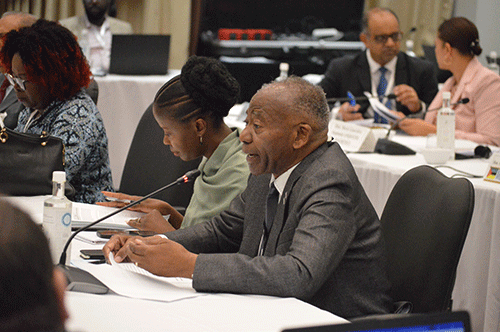Moses Magadza
PORT LOUIS – The welfare, rights and well-being of children are not just national concerns, but are of paramount importance to the SADC region, which must commit to this cause and ensure their voices and needs are heard and acted upon collectively for a better future.
This is the view of the Speaker of the National Assembly of Namibia, Professor Peter Katjavivi. He stated this while addressing the 54th Plenary Assembly Session of the SADC Parliamentary Forum (SADC-PF) in Mauritius last week.
He told the Plenary that as part of celebrating World Children’s Day held on 19 November, Namibia hosted a sub-regional celebration in collaboration with UNICEF Namibia at Walvis Bay.
“This event brought together children and leaders from Namibia, Botswana, Zambia and Zimbabwe. We were honoured to welcome the president of Botswana, the vice president of Zimbabwe, Zambia’s minister of community development and social services, and the UNICEF Regional Director for Eastern and Southern Africa, Etleva Kadilli, each accompanied by a delegation of young representatives, bringing together more than 300 children from across the sub-region for three days filled with festivities, dialogue and meaningful exchanges,” he noted.
Katjavivi said the highlight of the celebrations was an interactive session, where the children engaged directly with their presidents and ministers. During those discussions, a crucial point emerged: the need to expand this network to encompass the greater SADC region, thereby including more member states in the initiative.
He recalled a discussion with Kadilli on the critical challenges facing children in the SADC region, highlighting the urgent need for enhanced interventions and commitment in key areas such as education, disability, social protection and climate change.
“In Namibia, we have pioneered the concept of the Children’s Parliament, a unique forum where four children from each region come together to conduct their own parliamentary sessions. These young delegates elect their leadership, and with the support of a dedicated secretariat, their discussions and recommendations are formalised through a communiqué,” the Speaker said.
The communiqué is then presented to the National Assembly, and forwarded to the executive for implementation. A testament to its effectiveness is a recent achievement where the Children’s Parliament played a pivotal role in persuading the National Assembly and the minister of finance to increase disability grants in Namibia.
“This is a clear demonstration of the tangible impact such a forum can have on policy and legislative reforms,” Katjavivi told his audience.
Building on this success, he proposed that SADC PF considers hosting a Children’s Regional Parliament.
“This session will serve as a platform for young voices across the region to be heard, and their ideas to be transformed into actionable policies. This initiative will not only empower our children, but also drive meaningful change across the SADC region in the context of regional integration,” he reasoned. Turning to the theme of the meeting, “The Role of Parliaments in Promoting coordination for Enhanced Disaster Risk reduction and recovery Planning in the SADC Region”, Katjavivi said parliaments are the legislative backbone of nations, and have the leverage to shape comprehensive legal frameworks which underpin disaster risk reduction strategies.
“Our collective responsibility lies in crafting laws that create a resilient foundation for our communities, ensuring that the region is well-prepared to face the inevitable challenges of environmental disasters,” he told the members, who included other Speakers of Parliament as well as MPs from SADC member states.
He described parliamentary oversight as the linchpin in the region’s commitment to effective disaster management.
“Through dedicated committees and rigorous scrutiny, we hold governments accountable for the implementation of policies, and the efficient allocation of resources. This oversight not only safeguards the interests of our constituents, but also fosters a culture of transparency and accountability,” he said, adding that parliaments need to craft responsive budgets which can help to achieve the objectives of the Sustainable Development Goals, which include climate change mitigation and adaptation, among others.
“Our role as facilitators of dialogue and collaboration is vital by convening discussions and platforms such as this one that bring together policymakers for shared knowledge and experiences,” Katjavivi said.
The Speaker added that this collaborative exchange enriches parliamentarians’ understanding of regional vulnerabilities, paving the way for more informed decision-making in pursuit of effective disaster risk reduction.
When tasked with budgetary decisions, parliaments, therefore, become architects of mitigation, adaptation and resilience.
Through the approval of budgets which support disaster risk reduction and recovery initiatives, they ensure that financial resources are strategically directed towards projects which enhance the region’s preparedness and response capabilities.
Katjavivi maintained that parliaments must be involved in promoting coordination for enhanced disaster risk reduction and recovery planning in the SADC region.
The responsibility of parliaments in this regard transcends borders and political affiliations, emphasising the shared commitment to the safety and well-being of the current and future generation of the region’s citizens.
“Let us, as representatives of the people, continue working hand in hand, crafting legislation, providing oversight and fostering collaboration to build a more resilient and secure future for the SADC region. It is my wish that collaborations of this magnitude translate into tangible outcomes,” he stated.
* Moses Magaza is a freelance journalist.


